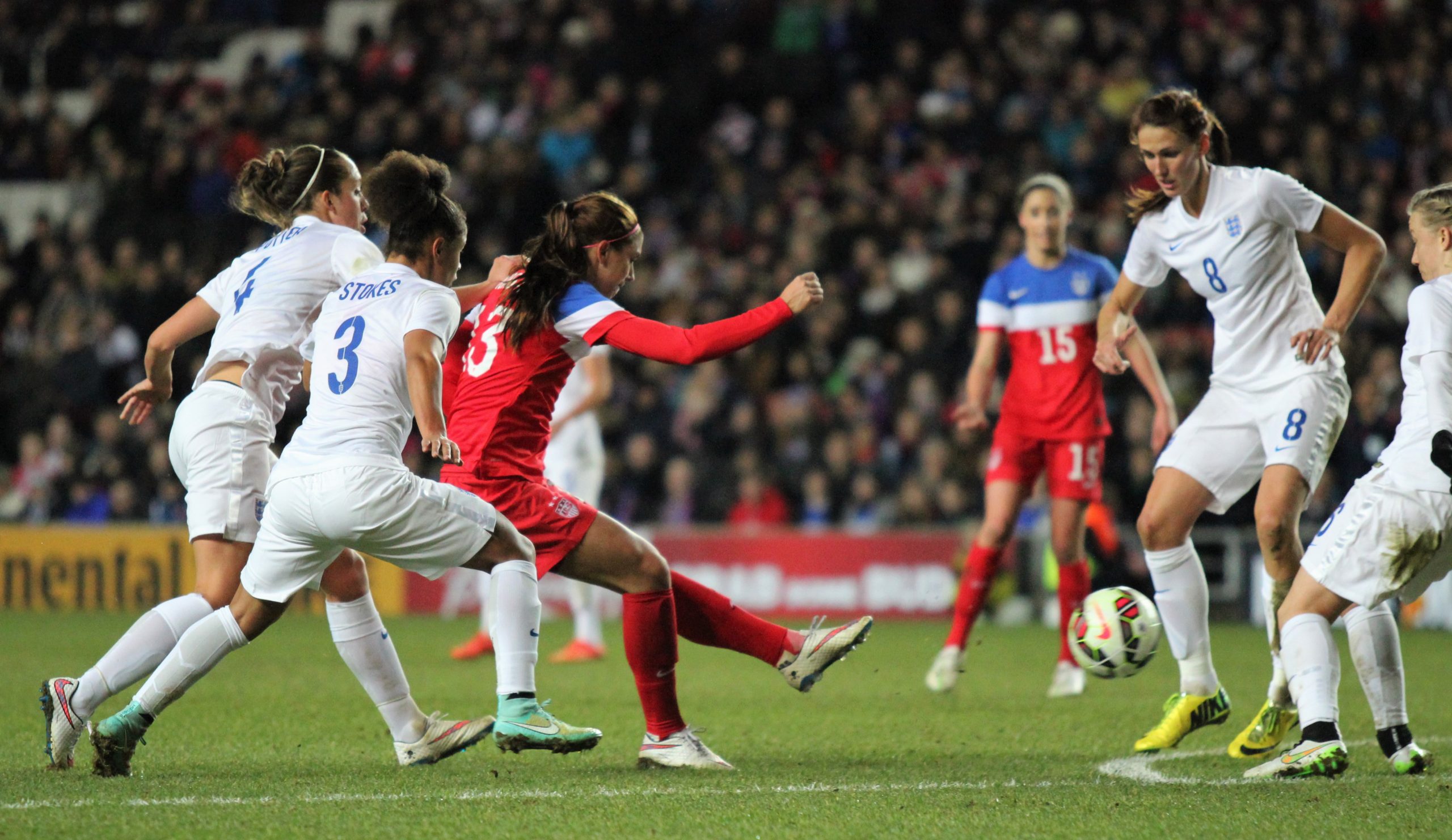Back-to-Back: How the Lionesses’ EURO 2025 Win Impacts the Sports Industry

Image: “England Women’s vs USA (16553474105)” by joshjdss, originally uploaded to Wikimedia Commons; licensed under Creative Commons Attribution 2.0 Generic (CC BY 2.0).
On the 27th of July, the Lionesses made history by beating Spain on penalties to win the UEFA Women’s EURO 2025, becoming the first England side to win a major tournament on foreign soil.
This caps off a record-breaking tournament that saw significant attendance and viewership figures surpassed. This includes 657,088 spectators attending the tournament, an 82,213 increase on the 2022 edition hosted by England.
After the historic win, we spoke to four current and incoming GIS students specialising in various subject areas to understand the impact of the Lionesses win, and what it means for the sports industry.
Vilde Ringstad – MSc International Sports Management Student
England as a Blueprint for Global Growth
Born in Norway, Vilde works in Football Operations at Heming Football – part of Norway’s largest multi-sport group.
Beginning her GIS studies in September 2024, Vilde discussed why she believes the Lionesses won the tournament and the effect that can have on the future of the women’s game.
Vilde saw England’s squad depth as the reason for their success, saying: “Being able to use up to 20 players without dropping in performance is remarkable and shows how player development has grown in England.
“This builds from a strong top two tiers and investment over the past few years.”
This is a trend that looks set to continue, with the WSL aiming for two fully-professional leagues in England. Part of this is the first division increasing from 12 to 14 teams from the 2026/27 season, encouraging investment throughout the pyramid.
With Vilde labelling recent investment as a major contributing factor to England’s success, she is hopeful that other countries follow suit as they chase their own European glory.
“In Norway we are falling short, but we’re seeing a shift.
“There is still development needed across all nations,” she added, “which provides more roles and more ideas to be brought to the table. Through International Sport Management there are millions of things to go into, and the recent Euros just showed how much more is to come!”
Dominic Gibson – MSc Performance Analysis in Football Student
The Rise of Data and Rivalries in Women’s Football
“The Lionesses have recently revolutionised the world of Women’s Football,” says Dominic Gibson, a performance analyst studying at GIS.
With a growing women’s football culture off the back of the EURO 2022 win, Dominic feels the impact of the 2025 win will come through the next generation of players.
“The Lionesses will have inspired millions of women of all ages to get into football,” he said, mentioning the EUROs final being the most watched TV broadcast of the year in England.
“Winning the EUROs in 2022 already had a massive effect on the UK game.
“The growth is undeniable, and a consecutive title will only push it even further.”
With the sporting world becoming more and more reliant on technology and data analysis, Dominic also expressed his views on how England’s 2025 glory will impact his area of work.
“I am truly excited to see the industry develop due to the growth of the women’s game. More analyst roles are becoming available within women’s first teams, as well as within many girls’ academies across the country.”
“There is an ever-growing demand for performance analysis within football, and both industries are growing together.”
He also noted that the 2025 Final emphasised the importance of opposition analysis ahead of high-pressure situations such as penalty shootouts— two of which England fans endured before the trophy was lifted.
These shootouts against Sweden and Spain included four penalties saved by Chelsea’s Hannah Hampton. With notes taped to her arm by the goalkeeping coach, her shootout performances emphasised the work carried out behind the scenes with the coaching staff.
Finally, Dominic spoke about the impact of rivalries on creating interest and engaging fans, with England vs Spain being a significant one going forward.
“World class battles are becoming a regular occurrence,” he explained, going on to suggest that two major finals in a row featuring the same two nations will play a large part in building storylines fans will find interesting.
Mmamoagi Kungoane – Incoming BA (Hons) Sports Management Student
A Global Perspective on England’s EURO Dominance
Joining us at GIS later this year, South Africa-born Mmamoagi offered a global perspective, exploring the importance of England’s recent dominance in underlining the room for improvement around the world.
“Watching the Lionesses win the EUROs was emotional and inspiring.”
“It also highlights a growing gap,” she continued. “The Northern Hemisphere is investing, marketing, and dreaming bigger. Meanwhile, in Africa, we’re still negotiating for the basics.”
“Here in South Africa, our national team were fighting just to be paid… It’s heart-breaking.”
This comes after reports emerged that South African players, winners of the 2022 Women’s Africa Cup of Nations (WAFCON), had boycotted training as part of a payment dispute.
Looking ahead, Mmamoagi emphasised the potential in African sport, saying: “Our athletes deserve better systems.”
“Their talent is world-class, but the opportunities aren’t. I’m motivated to be part of changing that—to keep poking the system and advocating for environments where women athletes can thrive without compromise.”
Mikhela Treon – MSc Sports Marketing & Media Student
How the Lionesses are ‘Redefining Success’
The latest recipient of GIS’ South Asians in Football Leadership Scholarship, Mikhela Treon feels that, from a media point of view, the involvement of women in football has gone under the radar.
“The truth is, women have always been in and around the game of football – just not always seen, heard, or valued as they should be.”
Labelling the exceptional viewership figures as “undeniable proof” that the women’s game is on the rise, Mikhela sees the Lionesses’ success as symbolic, saying the team has “redefined what success looks like for women in sport.”
“A cultural shift is changing perceptions, challenging outdated narratives, and proving that women’s football can command the same passion, respect, and commercial interest as the men’s game is fully underway.
“For women like myself hoping to break into the industry, the momentum only further ignites our passion and ambition to contribute positively to this growth. But to truly cement this progress, sport needs more female leaders, on the pitch, in the boardroom, and at every decision-making table.”
As our students have found, England’s success at EURO 2025 points towards the dramatic growth of the women’s game. With more employment opportunities being created, our GIS aims to prepare sporting professionals for their next step into a career in the sports industry.
If you’ve been inspired by the Lionesses and dream of working in women’s football, explore our specialist sports courses today.
Article by Zakaria Anani
Our Partners
















